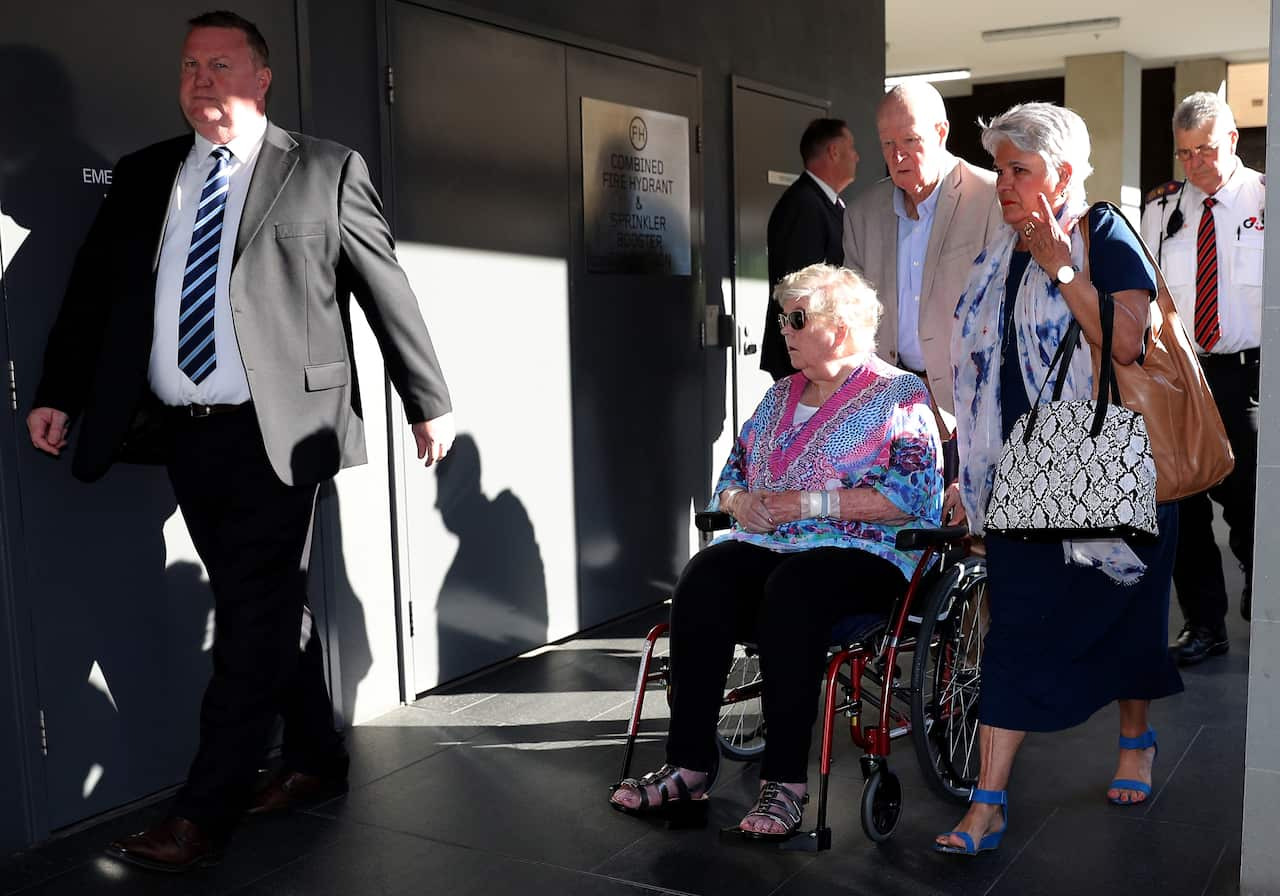Accused Claremont serial killer Bradley Robert Edwards has been found guilty of murdering two women in Perth in the 1990s but acquitted of slaying a third woman.
Edwards, 51, denied killing secretary Sarah Spiers, 18, childcare worker Jane Rimmer, 23, and solicitor Ciara Glennon, 27, after they each spent a night out with friends in the affluent suburb's pubs in 1996 and 1997.
The confessed rapist and ex-Telstra technician faced a seven-month trial in the Supreme Court of Western Australia which concluded in late-June.
Justice Stephen Hall on Thursday delivered his long-anticipated verdicts, finding Edwards guilty of murdering Ms Rimmer and Ms Glennon but not guilty of murdering Ms Spiers.
Ms Spiers' body has never been found.
Television crews and media lined the street outside the court building, alongside up to one hundred members of the public hoping to get a seat in the public gallery. Some had lined up since 4am.
Families of the murdered women entered the courtroom first, before former Telstra technician Edwards arrived amid tight security.
Justice Stephen Hall began delivering his verdict by describing the trial as ‘like no other’.
“The events in question occurred more than 20 years ago, but have haunted the memory of many people and troubled the public conscience,” he said.
WA’s 'trial of the century’ sat for 95 days over seven months, and included 10,828 pages of transcript, 240 witnesses and 2,879 exhibits.
Justice Hall said each of the women were abducted and killed, and said that DNA, forensic and propensity evidence lead him to conclude that Jane Rimmer and Ciara Glennon were killed by the same person.
“There are significant similarities between the circumstances for heir disappearances and deaths…those similarities establish beyond reasonable doubt that the same person killed both Ms Rimmer and Ms Glennon,” he said.
Justice Hall found that Mr Edwards had killed both women after abducting them from Claremont using his work vehicle, a VS Holden Commodore station wagon, the kind driven by Telstra employees at the time.
Edwards then drove each of the women to bushland in semi-rural areas outside off Perth, where he stabbed each victim in the neck with a sharp instrument causing fatal injuries. He then concealed their bodies with vegetation.
Edwards sat motionless in the courtroom as the verdict was read out, occasionally looking down or shaking his head.
But Justice Hall said the evidence was insufficient to find Edwards guilty beyond reasonable doubt of the murder of Sarah Spiers.
“The propensity evidence makes it more likely that the accused was the killer of Ms Spiers but it cannot prove it beyond reasonable doubt, in the absence of any other evidence as to the identity of her killer."
Justice Hall said the existence of DNA evidence was crucial to convicting Edwards of the murders.
“I am satisfied that the evidence established beyond reasonable doubt that the DNA of the accused was under the nails of Ms Glennon’s left hand, and that it got there in the course of a violent struggle that occurred shortly before her death”.
"The fibre evidence establishes that each of Ms Rimmer and Ms Glennon were in a VS Holden Commodore car that was habitually driven by a Telstra employee in the short time before their deaths…the accused drove such a vehicle at the relevant times”.
As the court adjourned, the parents of Sarah Spiers were consoled by WA Police Commissioner Chris Dawson. Prosecutor Carmel Barbagallo was seen weeping alongside the families of the murdered women.
"We got the result we wanted ... now we just have to keep working for the Spiers family to help find Sarah. It's very sad,” Lee Rimmer, Jane Rimmer’s sister, told reporters outside court.
Other family member left court and declined to speak to the media.
Edwards has been remanded in custody and will face court again for sentencing on 23 December.
Edwards, who called himself the "bogeyman" online and repeatedly lied to detectives about his sex attacks, had insisted he was not the notorious predator who stalked women in Perth's wealthiest suburbs in the mid-1990s.
Justice Hall spent almost three months considering the evidence which included testimony from more than 200 witnesses as well as DNA and fibre analysis. Edwards was charged with the murder of Ms Rimmer and Ms Glennon after a raid on his Kewdale home in December 2016.
Edwards was charged with the murder of Ms Rimmer and Ms Glennon after a raid on his Kewdale home in December 2016.

Jenny Rimmer, mother of Jane Rimmer arrives at the Supreme Court of Western Australia in Perth. Source: AAP
He was charged with Ms Spiers' murder in February 2018.
The bodies of Ms Rimmer and Ms Glennon were discovered in bushland weeks after they were killed, but Ms Spiers' body has never been found.
Edwards committed his first known offence against women in 1988, breaking into the Huntingdale home of an 18-year-old acquaintance and indecently assaulting her as she slept.
It provided the crucial piece of evidence homicide detectives needed to arrest him almost 29 years later.
He'd left behind a semen-stained silk kimono stolen from a washing line and when it was finally tested in November 2016, DNA matched swabs taken from a teenager he abducted from Claremont then raped at nearby Karrakatta Cemetery in 1995.
It also matched cellular material found under Ms Glennon's fingernails.
Edwards didn't admit the Huntingdale and Karrakatta crimes until the month before his judge-alone trial began.
The defence case lasted mere minutes, with Edwards electing not to take the stand and his barrister calling no witnesses.
But his lawyers suggested throughout the trial that the DNA evidence had been contaminated in the laboratory by samples taken from Edwards' rape victim.
Prosecutors alleged fibres from Edwards' work car and clothes were found on Ms Glennon, Ms Rimmer and the rape victim.
- Additional reporting by AAP.











